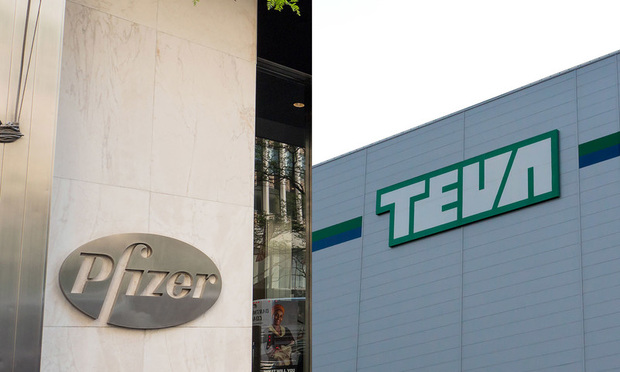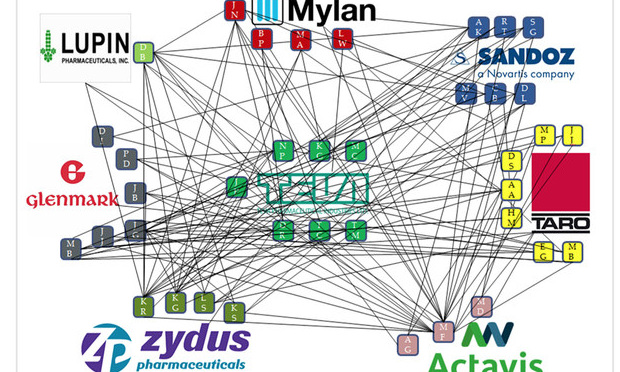 The drug companies had fought to prevent details of the lawsuit from becoming public, but a federal judge granted the states' motion to unseal the complaint. (Photo: Shutterstock.com)
The drug companies had fought to prevent details of the lawsuit from becoming public, but a federal judge granted the states' motion to unseal the complaint. (Photo: Shutterstock.com)
A newly unredacted antitrust lawsuit against individual defendants and 20 corporate makers of generic drugs reveals details of how the pharmaceutical companies allegedly conspired to fix prices on more than 100 medications.
The companies describe their practices using such terms as “fair share” or “playing nice in the sandbox.”
But attorneys general from across the country allege a systematic conspiracy involving thousands of emails and phone calls to stifle competition and cause prices on generic antidepressants and other drugs to sometimes rise 1,000 fold.
Related: Drugmakers accused of generic-drug price fixing in new antitrust lawsuit
Attorneys general from 44 states, including Connecticut, Delaware, Florida, New York, New Jersey and Pennsylvania, filed suit against Teva Pharmaceuticals USA Inc., Pfizer Inc., Sandoz Inc., Mylan Pharmaceuticals Inc., and other defendants in May. But the details of those allegations weren't made public until this week, when the Office of the Connecticut Attorney General released an unredacted version of the 524-page lawsuit.
The drug companies had fought to prevent details of the lawsuit from becoming public, but a federal judge granted the states' motion to unseal the complaint.
Here are some of the key takeaways.
Lawyers allegedly helped fend off congressional inquiries
The lawsuit shows, for example, that in early October 2014, Heritage Pharmaceuticals received a letter from U.S. Rep. Elijah Cummings and U.S. Sen. Bernie Sanders as part of an inquiry into generic drug pricing.
“Heritage's outside counsel immediately set out to coordinate a response with counsel for defendants Teva and Mylan, to provide what he referred to as 'polite f-u' letters to Congress,” the lawsuit stated.
The attorneys general include in their complaint an alleged email to Heritage's Chief Executive Officer Jeff Glazer from an unidentified lawyer serving as the company's outside counsel.
That email allegedly informed the CEO his attorneys were working with lawyers from Teva and Mylan to schedule a conference call to ensure the companies were “all on the same page.”
“The consensus is, at this point, that the response will be polite f-u letters,” according to the email cited on page 356 of the lawsuit.
No one from Teva or Mylan's media relations offices responded to a request for comment.
But Denise Bradley, a spokeswoman for Heritage, denied any wrongdoing.
“Heritage has no visibility into how other companies responded to the congressional inquiry, but I can tell you that Heritage fully responded to the inquiry received from Sen. Sanders and Rep. Cummings, multiple times, by providing substantive and confidential information about its product sales and pricing data in order to assist and better inform the investigation,” Bradley said.
Girls' nights out and other social events
The lawsuit also notes that top officials from competing companies regularly spent time together at events such as golf outings, “girls' night out,” conferences, trade shows and industry dinners that companies would take turns sponsoring.
It alleges the companies cultivated close ties, shown in emails, top drug company executives called competitors “fraternity brothers” and declared love for each other.
But the attorneys general allege a sinister goal.
 This chart shows the extent of communication among drug companies related to alleged price-fixing, according to an antitrust lawsuit by attorneys general in 44 states.
This chart shows the extent of communication among drug companies related to alleged price-fixing, according to an antitrust lawsuit by attorneys general in 44 states.“These trade shows and customer conferences provide generic drug manufacturers, including but not limited to the defendants, with ample opportunity to meet, discuss, devise and implement a host of anti-competitive schemes,” the suit claims.
Mike Cole, chief of the antitrust and government fraud department at the Connecticut Attorney General's Office, said while it's not technically illegal for competitors to gather at such functions, he's confident those functions were more than just friendly events.
“These multiple outings provided an opportunity to collude,” Cole said. “When you are at the bar or the first tee with a competitor, it stands to reason that there is an incentive to start to talk about business. One thing leads to another and, over time, these outings provided opportunities to discuss business and, more specifically, customers and pricing for specific drugs.”
Cole said he is convinced top drug company officials knew what they were allegedly doing was wrong.
“The first thing you are taught in antitrust training is to not discuss future and current pricing and customers with your competitors,” he said. “They knew it was wrong.”
Drug company officials describe their interactions as professional encounters to foster legitimate and reasonable business ties.
But Cole disagreed.
“It's about not undercutting another competitor when they raise prices, and to not try to steal another competitor's customers,” he countered.
Fair share
Top company officials often referred to “fair share,” a term widely used in the industry to allegedly describe an agreement among the largest companies, to divide the generic drug market among themselves, rather than allowing market forces to do so. In this way, they stifled competition and caused prices to rise, rather than drop, according to attorneys general.
“Once a manufacturer has achieved its fair share, it is generally understood that the new competitor will no longer compete for additional business,” according to the complaint. “The common goal or purpose of this overarching agreement is to keep prices high, avoid price erosion and serve as the basis for further supra-competitive price increases.”
The defendants deny any wrongdoing.
Teva, Pfizer, Sandoz and Mylan are the four largest makers of generic drugs listed as defendants.
“As the company stated when the states' initial complaint was filed on May 10, we have cooperated with the Connecticut Attorney General since [Pfizer subsidiary] Greenstone was contacted over a year ago,” Pfizer spokeswoman Sally Beatty said. ”After carefully reviewing the complaint, the company stands by its initial conclusion that neither we nor our colleagues participated in unlawful conduct.”
Sandoz also denied wrongdoing and re-issued the same statement it had in May.
“We believe that these claims are without merit and will vigorously contest them,” it said.
Leslie Pott, Sandoz's communications vice president, declined to comment Tuesday on any of the specific allegations outlined in the newly unredacted lawsuit.
Connecticut Attorney General William Tong spearheaded the suit by 44 states, excluding California, Texas, Georgia, South Dakota, Arkansas and Wyoming.
“The evidence is undeniable and the conspiracy is unconscionable,” he said. “Our lawsuit alleges that generic drug manufacturers engaged in a brazen, industrywide conspiracy to fix prices and allocate market share for drugs that we rely on every day.”
Read more:
© 2025 ALM Global, LLC, All Rights Reserved. Request academic re-use from www.copyright.com. All other uses, submit a request to [email protected]. For more information visit Asset & Logo Licensing.








